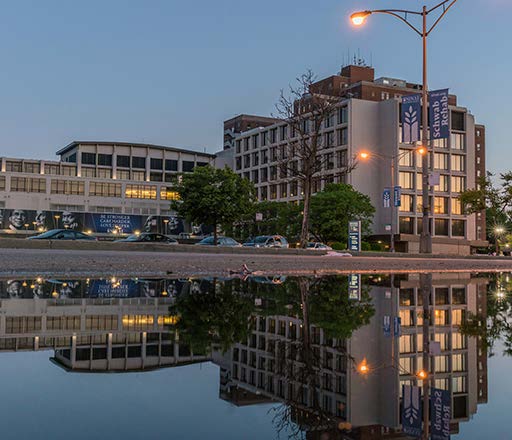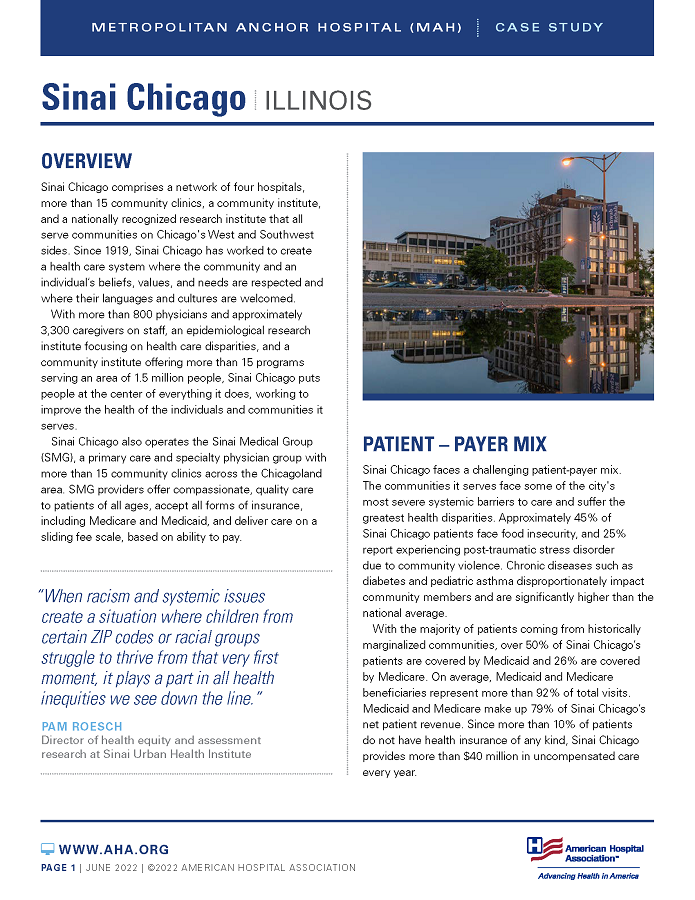

Sinai Chicago | Illinois
Metropolitan Anchor Hospital (MAH) | Case Study
Overview
 Sinai Chicago comprises a network of four hospitals, more than 15 community clinics, a community institute, and a nationally recognized research institute that all serve communities on Chicago's West and Southwest sides. Since 1919, Sinai Chicago has worked to create a health care system where the community and an individual’s beliefs, values, and needs are respected and where their languages and cultures are welcomed.
Sinai Chicago comprises a network of four hospitals, more than 15 community clinics, a community institute, and a nationally recognized research institute that all serve communities on Chicago's West and Southwest sides. Since 1919, Sinai Chicago has worked to create a health care system where the community and an individual’s beliefs, values, and needs are respected and where their languages and cultures are welcomed.
With more than 800 physicians and approximately 3,300 caregivers on staff, an epidemiological research institute focusing on health care disparities, and a community institute offering more than 15 programs serving an area of 1.5 million people, Sinai Chicago puts people at the center of everything it does, working to improve the health of the individuals and communities it serves.
Sinai Chicago also operates the Sinai Medical Group (SMG), a primary care and specialty physician group with more than 15 community clinics across the Chicagoland area. SMG providers offer compassionate, quality care to patients of all ages, accept all forms of insurance, including Medicare and Medicaid, and deliver care on a sliding fee scale, based on ability to pay.
“When racism and systemic issues create a situation where children from certain ZIP codes or racial groups struggle to thrive from that very first moment, it plays a part in all health inequities we see down the line.”
Pam Roesch
Director of health equity and assessment research at Sinai Urban Health Institute
Patient–Payer Mix
Sinai Chicago faces a challenging patient-payer mix. The communities it serves face some of the city's most severe systemic barriers to care and suffer the greatest health disparities. Approximately 45% of Sinai Chicago patients face food insecurity, and 25% report experiencing post-traumatic stress disorder due to community violence. Chronic diseases such as diabetes and pediatric asthma disproportionately impact community members and are significantly higher than the national average.
With the majority of patients coming from historically marginalized communities, over 50% of Sinai Chicago’s patients are covered by Medicaid and 26% are covered by Medicare. On average, Medicaid and Medicare beneficiaries represent more than 92% of total visits. Medicaid and Medicare make up 79% of Sinai Chicago’s net patient revenue. Since more than 10% of patients do not have health insurance of any kind, Sinai Chicago provides more than $40 million in uncompensated care every year.
Sinai Chicago's Unique Approach to Care
Despite many challenges, Sinai Chicago works hard to serve the community and holistically care for every patient that walks through its doors.
Investment in Community Health
Sinai Chicago has long pioneered community health as a way to improve patient outcomes in the city’s historically marginalized communities. For more than 25 years, the system has operated the Sinai Community Institute, which serves approximately 14,000 families each year by developing effective community-based health and social service programs to improve health and well-being by addressing social, economic, and environmental factors. Furthermore, the Sinai Urban Health Institute works in partnership with community members and organizations to document disparities and meet the shared goal of a healthier community. And the Sinai Medical Group’s 15 practices provide primary care and specialty medicine in neighborhoods with few, if any, alternatives to accessing health care.
Public-Private Partnerships as Community Development
A lack of affordable housing, employment opportunities, and access to basic services such as banking all impact the health and well-being of many Chicago communities. To help address the needs of Chicago’s North Lawndale neighborhood, Sinai Chicago partnered with The Habitat Company, Chicago Housing Authority, Cinespace Chicago Film Studios, and the City to transform 10 acres of mostly vacant property into 120,000 square feet of commercial and retail space plus hundreds of mixed-income housing units. The Ogden Commons project represents a meaningful investment in a long-disinvested community.
Fostering Diversity, Equity, and Inclusion (DEI) in the Workforce
Recognizing the responsibility to address structural inequities among the workforce, Sinai Chicago has been very intentional about investing in DEI. Among the executives on Sinai Chicago's senior leadership team, 51% identify as people of color—higher than many other health systems. Sinai Chicago is also a member of the Healthcare Forward collaboration, which provides workforce development and promotes health care careers across Chicago’s West and South sides.
Metropolitan Anchor Hospitals Need Greater Support
Despite the financial challenges Sinai Chicago faces, the system has maintained its commitment to improving the health of the individuals and communities it serves. But to be more impactful, adapt to a fast-changing health care landscape, and invest in critical infrastructure, staff, and care services, MAHs like Sinai Chicago need additional support.
“Faced with inflation and higher costs, our only options are to cut essential services or seek out additional federal or state funding,” said Gary Krugel, Executive Vice President/Chief Financial Officer of Sinai Chicago. With adequate, sustained federal support, MAHs like Sinai Chicago will be better positioned to maintain and expand essential programs, increase capacity to care, and continually adapt to meet their communities’ evolving medical needs.


